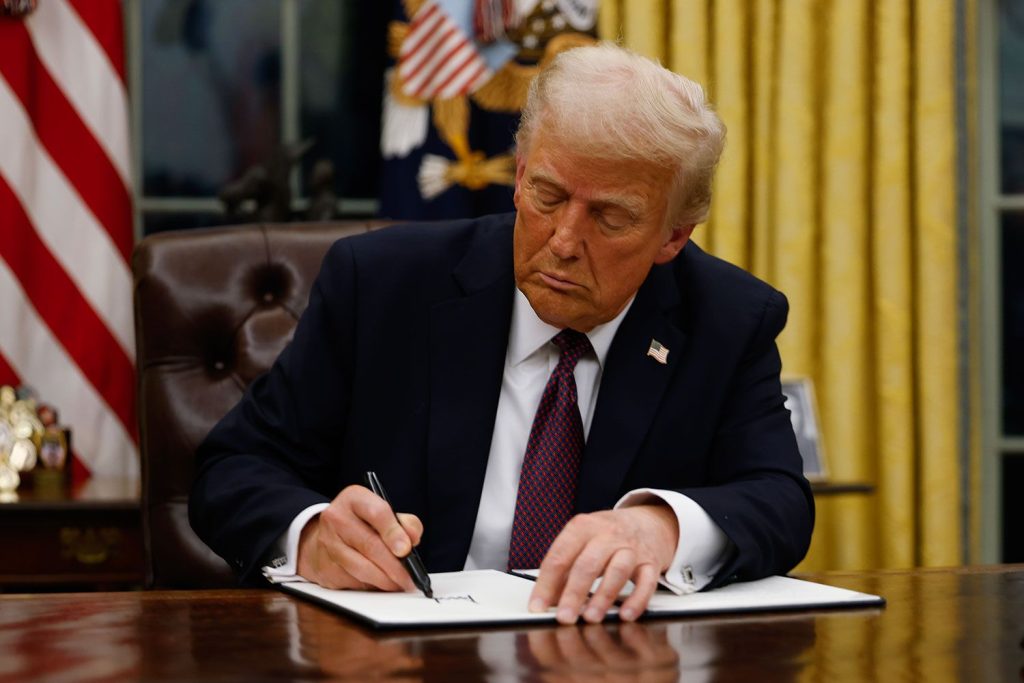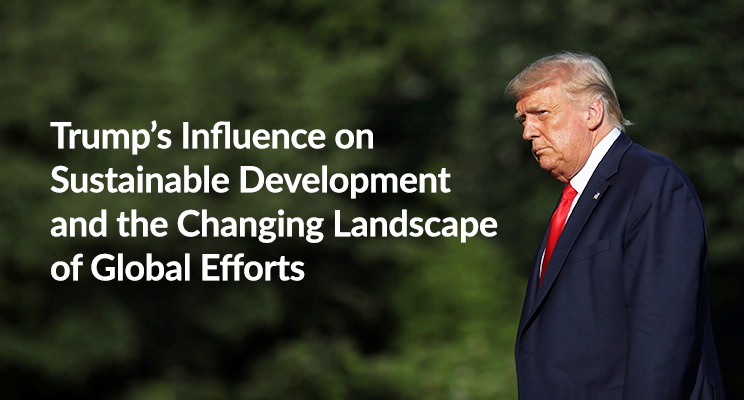Donald Trump’s presidency marked a significant departure in the U.S.’s approach to sustainability and foreign policy. With his “America First” agenda, Trump prioritised domestic concerns over global commitments. This led to the U.S. withdrawal from key international organisations, the dismantling of foreign aid programs, and reduced funding for health and environmental initiatives. These decisions reshaped U.S. global engagement and disrupted international efforts in areas such as public health, climate change, and economic cooperation.
U.S. Withdrawal from the WHO, A Blow to Global Health Initiatives

One of the most notable actions of Trump’s presidency was the U.S. withdrawal from the World Health Organization (WHO). As one of the largest contributors, the U.S. provided nearly 18% of the WHO’s budget, supporting vital programs in disease prevention, emergency response, and vaccine distribution.
The withdrawal created a funding gap for many WHO initiatives, raising concerns about its impact on global health, particularly in low-income countries that relied heavily on international support. While the U.S. redirected some funds to alternative health initiatives, the decision disrupted global health coordination and pandemic response strategies.
Withdrawing from the Paris Agreement and Climate Policy Shifts
One of the most globally significant decisions was the U.S. withdrawal from the Paris Climate Agreement, signalling a shift away from federal commitments to reducing carbon emissions. This move also ended funding for international climate programs, such as the Green Climate Fund and reinforced an “America First” energy policy that prioritised domestic economic interests over global sustainability efforts.
The Trump administration’s climate policy took a different approach, marked by the decision to exit the Paris Agreement and roll back several environmental regulations. This shift was based on concerns that international agreements imposed economic burdens on U.S. industries. The administration’s focus on energy independence and deregulation spurred increased domestic fossil fuel production, prompting debates over balancing economic growth with environmental sustainability.
This shift altered the global climate action landscape, as the U.S., traditionally a leader in international climate negotiations, retreated from its influential role. Critics argue that this isolation weakened global climate efforts, while supporters claim it restored flexibility for U.S. industries. Furthermore, Project 2025’s perspective aligned with this approach, suggesting that U.S. energy challenges were shaped by past environmental policies and recommending future leadership focus on prioritising national energy resources.
U.S. Engagement with International Organizations
Trump reassessed U.S. involvement in several international organisations, citing concerns over financial contributions and national sovereignty. In addition to withdrawing from the WHO, the U.S. reviewed its participation in institutions like the United Nations and the OECD. These shifts reflected a broader focus on bilateral relationships over multilateral cooperation, prioritising direct negotiations and strategic partnerships.
Encouraging Resource Development in Alaska
Alaska has long been a battleground between economic opportunity and environmental conservation. Trump’s executive orders aimed to promote the development of Alaska’s oil, gas, and mineral resources by opening protected lands like the Arctic National Wildlife Refuge (ANWR) and the National Petroleum Reserve-Alaska (NPR-A) to extraction activities.
These actions were intended to bolster energy independence and create jobs but raised concerns about environmental degradation, the impact on Indigenous lands, and increased carbon emissions. While proponents emphasised economic benefits, environmental groups warned of the accelerated climate change and harm to fragile ecosystems.
Declaring a National Energy Emergency
To address rising energy costs and reduce reliance on imports, Trump declared a national energy emergency. This executive order aimed to remove restrictions on fossil fuel production and prioritise traditional energy sources such as coal, oil, and natural gas.
Key actions included:
- Expanding oil and gas leases on federal lands and offshore sites.
- Accelerating pipeline development.
- Reducing environmental permitting requirements for drilling.
- Potentially tapping into the Strategic Petroleum Reserve (SPR) to stabilise fuel prices.
While framed as a step toward energy security, critics argued that this approach undermined long-term sustainability goals and could strain relations with international climate partners.
Rolling Back Electric Vehicle (EV) Policies and Emissions Regulations
In another major shift, Trump’s administration rolled back policies designed to encourage the transition to electric vehicles (EVs). The administration revoked federal mandates for automakers to prioritise EV production and eased emissions standards for traditional vehicles.
Key changes included:
- Loosening EPA fuel efficiency standards.
- Cutting subsidies for EV manufacturers.
- Encouraging fossil fuel use by reducing restrictions on refineries and oil drilling.
These moves were framed as efforts to reduce production costs for automakers, but environmental advocates warned that they could slow innovation in clean transportation and increase greenhouse gas emissions, hindering global climate efforts.
Trump’s presidency significantly altered U.S. international development policies, including adjustments to global organisation contributions, foreign aid strategies, and climate and economic priorities. These decisions had varying effects on global health, environmental efforts, corporate taxation, and humanitarian aid. The long-term impacts of these shifts will depend on future diplomatic relations, economic developments, and the priorities of subsequent U.S. administrations.
As the global landscape continues to evolve, ongoing discussions about multilateral cooperation will be crucial for addressing the world’s most pressing challenges. The path forward will depend on how nations collaborate to tackle complex global issues.


